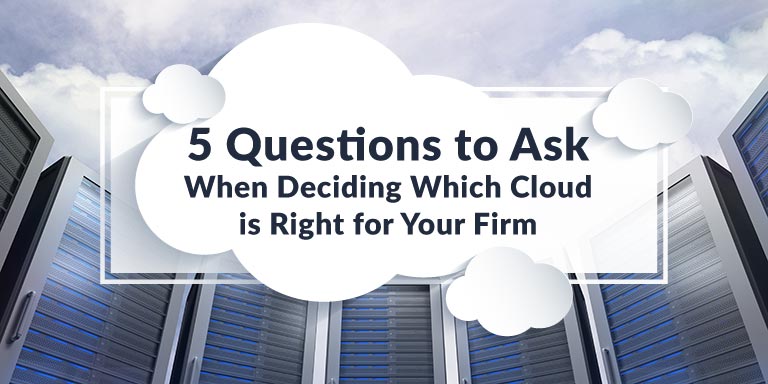5 Questions to Ask When Deciding Which Cloud is Right for Your Firm


You’ve heard us talk about cloud computing and migrating to the cloud. But, it’s about time we start talking about taking Technology as a Service (TaaS) to a whole new level by examining what your firm will need to consider when attempting cloud migration.
There are a number of different types of clouds, but the three most common for a professional service firm include Public, Private and Hybrid cloud solutions. All cloud deployment models offer benefits, so you’ll need to determine which cloud matches the needs of your firm best.
First, let’s evaluate different types of clouds:
- Public: A public cloud is a standard cloud computing model in which a service provider makes resources, such as applications and storage, available to the general public over the internet. Public cloud services typically allow a large number of users from many different firms to share the same infrastructure.
- Private: A private cloud is a type of cloud computing that delivers the cloud advantages including scalability and self-service, but through a proprietary architecture. A private cloud is dedicated to a single organization.
- Hybrid: A hybrid cloud environment uses a mix of on-premises, private cloud and public cloud services with orchestration between two platforms.
In order to help you determine which cloud is right for your firm, here is a list of questions your firm can ask itself as you migrate to the cloud:
1. How many offices do we have?
Maybe your firm has just one office – That’s OK! Or, maybe your firm is ready to expand into multiple locations – Go you! One thing is certain, however, in order to meet IT Disaster Recovery requirements for Payment Care Industry Data Security Standard (PCI DSS), it’s imperative to store back-ups in a secure, preferably off-site, location. On the contrary, your firm may want to downsize and remove all IT from in-house, potentially limiting the number of offices, or floors, your firm has. In either case, a private cloud or hybrid cloud may be best for your firm in this situation.
2. How much do we spend on IT costs monthly?
Speaking of downsizing your firm, when was the last time you took a look at your IT costs? Have you compared your Total Cost of Ownership (TCO) to the cost of cloud computing? According to a CIO article, there are 12 operational costs that your firm should consider when looking at auditing your IT costs. In any case, Software as a Service cloudis typically a more efficient option versus the costly alternative of developing your firm’s own software. If keeping IT costs minimal is essential to your firm, a private cloud may be the best fit.
3. How old is our server infrastructure?
“As the workload on servers continue to increase, replacing aging hardware becomes a commercial imperative,” David Howell wrote in a Tech Radar article. “IT managers can expect servers that are more than five years-old to have about a third more downtime than new hardware.”
Outdated infrastructure can cost your firm several days of downtime each year, which is why Infrastructure as a Service (IaaS) have become increasingly more popular amongst firms of all sizes. On the other hand, upgrading and purchasing new server infrastructure every five years can be a burden on your wallet. A private cloud or a hybrid cloud could save your firm from having to spend thousands of dollars on new infrastructure and several days a year from dreaded downtime.
4. Do employees work outside of the office?
According to the Latest Telecommuting Statistics, regular work-at-home has grown by 115 percent since 2005 and 3.7 million employees now work from home at least half the time. Desktop as a Service (DaaS) offers serious benefits to a mobile attorney or accountant. A public, private or hybrid cloud are all solid candidates for working remotely.
5. Have we been hacked?
On Oct. 3, 2017, Verizon Communications announced that a 2013 cyber-attack breached all 3 billion Yahoo accounts. According to a New York Times article, hackers made off with names, birth dates, phone numbers and passwords that were encrypted with security. Compromising the personal information of even just one client can be costly to your firm and damaging to your firm’s reputation. Having the right Platform as a Service (PaaS) could make a world-wide-web of a difference for your firm if protected by a private PaaS provider firewall. If cybersecurity is a concern, or your firm has been hacked in the past, a private cloud would be an ideal option.
Confused by terms like DaaS, SaaS, IaaS, TaaS, Hybrid Clouds, Public Clouds, Private Clouds? Let us help clear the fog and give you more clarity with this latest infographic.
